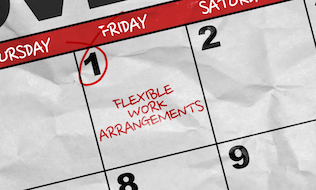
When my husband got a new job in Pickering, Ont., it became clear that a four-hour return commute from our west-end neighbourhood on public transit wasn’t sustainable for him.
We weighed the pros and cons of either moving or buying a car. The car won out, but only if we could both use it as our main way to get to work. For the first few weeks, my husband dropped me off downtown at 8:00 a.m. and aimed, optimistically, to collect me around 6:00 p.m.
Read: Generation Z wants supportive managers, flexible work hours: survey
Suddenly, I was spending the equivalent of a full extra weekday in the office each week. I tried to bring in the odd bit of personal paperwork to do at my desk once I’d put in a full day’s work. I vowed to read the dozens of tabs my browser had accumulated. I brought a book. I attempted some spectacularly uninspired creative writing. I organized and then re-organized my calendar.
Realistically, I was just killing time.
Luckily for me, my team talks a lot about the benefits of work arrangements that deviate from the nine-to-five. It was easy to bring up this liminal space I was existing in once everyone had gone home. My manager suggested I try working 10 hours a day, four days a week. I quickly jumped at the chance and have been working those four days a week ever since.
Here are four ways my new work schedule has changed my life:
- I have a very strict bed time.
If you told me a couple of years ago that I’d be waking up at 6:45 a.m. voluntarily, I’d have laughed in your face. And yet, here we are. But getting up to be at my desk for 8:00 a.m. doesn’t come naturally to me, so I’ve had to make some lifestyle changes to ensure I get enough sleep. I can’t accept as many invitations as I used to, but I’m actually finishing novels these days in a bid to be sleepy sooner.
- I’m comfortable taking my lunch away from my desk.
The office worker eating her sad little sandwich at her desk, failing to get up and enjoy a few minutes of fresh air, is a cliché for a reason. Especially with the — to my mind, quite toxic — prevalence of hustle culture, I rarely made it outside during my lunch while I worked a normal nine-to-five day. I was lucky if I got up to make myself a fresh cup of tea. When I did take a full hour, I’d get back to my desk and feel a sense of panic that there just wasn’t enough day left to finish the tasks I’d set out to accomplish by 5:00 p.m.
Read: Third of employees have left job for flexible working options
However, with a longer work day ahead of me, I now make a point of heading outside during lunch and taking a brisk walk. Getting through my ever-expanding to-do list is far more manageable when I let my mind rest during the middle of the day — not to mention the physical benefits of having an, admittedly gentle, workout built into my schedule four times a week.
- I am more focused.
The world of office space has tipped over, perhaps irreversibly, into open-concept, shared spaces — and Benefits Canada is no exception. I have a love/hate relationship with my desk. My colleagues are sweet, funny, interesting people. But the open office turns us into hypocrites. One moment, I’m loudly rounding the punch-line of a joke and the next moment I’m side-eyeing a co-worker who’s doing the same because I happen to be concentrating at that exact second.
But working longer hours means I’m in the office when it’s far quieter, even empty, so I can achieve lengthy periods of focus far more easily, while still being present in the more collaborative atmosphere that’s critical to other aspects of my work.
- I’ve had to embrace more work-life bleed.
For journalists, as in many other creative professions, it’s hard to completely leave work at work. Our team is better at this than most, which I highly value. However, for me, being away from work on a weekday when my colleagues are working as usual means that answering some emails on my day off is the least I can do. Flexibility is a two-way street. If my colleagues are willing to work around my new schedule, I need to be conscientious of how my absence might affect them.
Read: Flexible offices could contribute to local Canadian economies in next decade: study
Ultimately, I think I’m a more engaged employee because of how much this flexible arrangement helps me. I save time and money because I don’t have to choose between exhausting myself by being at my desk 50 hours a week or taking the streetcar home while feeling the sting of car payments leaving my pocket. But there are ripple effects contributing to my overall well-being as well. I see my family more often. My home is tidier. And I have more time to cook at home, exercise and work on creative projects.
I’d argue that every workplace has employees that would benefit from non-traditional work hours. Arrangements like mine, which cost my employer nothing, but provide me with a happier, healthier existence in a hundred little ways, are an untapped resource.
